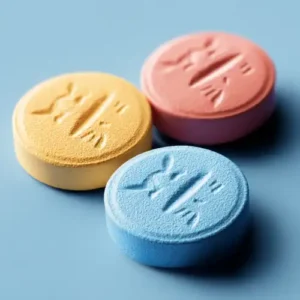Many people feel relaxed after a few drinks. This is because alcohol is a depressant. Drink too much alcohol and you may well pass out for the same reason!
Depressants are one of the three main categories of drugs. A few depressants, like alcohol, are taken recreationally by individuals who are looking to relax. In many scenarios, depressants can be used safely. However they can also be dangerous if used inappropriately. Many depressants are available only by prescription or are even illegal. So, what exactly are depressants?
The word ‘depressant’ comes from the root word depress. In relation to drugs, this term has nothing to do with feeling down or sad. In this context, ‘depress’ means to lower your level of activity and this is what a depressant drug does.
Depressants slow down the activity of the central nervous system (CNS) and the messages that are sent between the body and the brain. Alcohol is the most widely used legal depressant. Commonly used illegal depressants in the UK are cannabis and heroin. Many prescription drugs are also depressants, these include barbiturates and benzodiazepines (e.g. valium, temazepam).
Depressants can lower your level of awareness, decrease your heart rate, and slow down breathing. For these reasons, depressants are also known as ‘downers’.
The effects of depressants can change depending on the amount taken. Cannabis, for example, is normally considered a depressant, but when used in greater quantities it can act like a hallucinogen.
The Effects of Depressants
In smaller doses, depressants can cause calmness and relaxation. This can reduce anxiety and lower inhibitions.In larger doses, depressants can be quite dangerous. In worst cases they can cause slurred speech, respiratory depression, total loss of consciousness, loss of senses, and sometimes death.
Medical Uses of Depressants
Doctors will often prescribe depressants drugs to relieve symptoms associated with a variety of different disorders, including:
- Anxiety
- Depression
- Obsessive-compulsive disorder
- Insomnia
- Seizures
Workplace Drug Testing
Drug testing plays a vital role in detecting and deterring the misuse of depressants. Workplace drug testing programmes provide employers with a way to promote a safe, healthy and productive work environment.
Many jobs involve operating heavy machinery, driving vehicles, working with hazardous materials or being responsible for the safety of others. Being under the influence of drugs or alcohol on the job can lead to injuries, accidents and even fatalities. Workplace drug testing acts as a deterrent and can identify employees that pose a risk.
UK employers have a legal duty to ensure the safety and welfare of employees as set out in the Health and Safety at Work etc Act 1974. Drug testing provides a way for employers to fulfil this duty and mitigate risks. Pre-employment testing screens out candidates that could jeopardise safety. Random, post-incident and suspicion-based testing of existing employees also helps enforce drug-free workplaces.
The most common types of drug tests check for cannabis, cocaine, amphetamines and opiates. These can detect depressant drugs like cannabis and heroin for 1-4 days after last use. Testing methods include urine analysis, oral fluid testing, hair testing and fingerprint drug testing. Each has its own detection window showing how far back drug use can be identified.
The Dangers of Depressant Abuse
Depressant abuse can have severe and lasting consequences. These drugs act by suppressing brain and body functions, which can lead to dangerous effects when misused.
Overdose is a major risk, especially when depressants like alcohol or opioids are mixed with other substances. Consuming too much can cause respiratory depression, coma, and death. In 2020, over 75,000 people in the United States died from drug overdoses involving depressants.
Repeated abuse can also result in long-term organ damage. Heavy drinking, for example, can harm the liver, heart, and brain over time. The body becomes overwhelmed trying to metabolize large doses.
Additionally, regular use often leads to physical and psychological dependence. People become unable to function normally without the drug. Attempting to quit suddenly can trigger painful, difficult withdrawal symptoms.
Treating Co-Occurring Disorders
Many individuals struggling with substance use disorders also live with co-occurring mental health conditions like depression, anxiety, PTSD, or bipolar disorder. Over 30% of those with a substance problem also meet criteria for another psychiatric disorder.
Integrated treatment that addresses both issues concurrently has been found most effective. Psychotherapy helps patients develop healthier coping strategies. Medications can stabilize moods and control cravings. Support groups provide community and peer accountability.
A biopsychosocial approach considers biological, psychological and social factors influencing a person’s wellbeing. Treatment plans are tailored to each patient’s unique needs and challenges. Testing helps monitor progress and quickly detect any relapses.
Implementing Drug-Free Workplace Policies
Establishing clear workplace policies around substance use is crucial. This formally sets expectations for employees and outlines consequences for violations.
Comprehensive policies should cover:
- Prohibited behaviors – like using, possessing, selling, distributing or manufacturing controlled substances on the job.
- Testing procedures – when and how testing will be conducted.
- Disciplinary actions – for failing a drug test or otherwise violating policy.
Educating staff on policies through new hire orientation and regular training is also key. This ensures everyone understands risks, responsibilities and ramifications.
Drug-free workplace programs aim to promote health and safety. Testing acts as a deterrent while connecting struggling employees to helpful resources. Enforcement must balance compassion with accountability.
Depressant Abuse Support
Recreational use of depressants often leads to dependence and addiction. In 2020/21, over 600,000 adults in England and Wales sought treatment for drug and alcohol issues[1]. Heroin, cannabis and alcohol were amongst the most cited problematic substances.
Addiction treatment services provide medical care, counselling and group support. Medications can relieve withdrawal symptoms during detox. Talk therapy then helps individuals understand triggers, develop coping strategies and change behaviours. Support groups connect people with others going through similar challenges. Ongoing treatment substantially improves long-term recovery outcomes.
Relapse is common with substance use disorders. Drug testing is a useful tool during rehab and for monitoring recovery. It provides concrete feedback on treatment progress and reinforces accountability. Knowing tests will be conducted acts as an incentive for individuals to maintain abstinence. If lapses occur, early detection from testing allows interventions to prevent full-blown relapse.
Harm Reduction Initiatives
Harm reduction takes a pragmatic approach to mitigate the dangers of substance abuse rather than simply aiming to eliminate use. These public health policies and programmes address the real-world obstacles individuals face in overcoming addiction. They seek to reduce negative consequences when eliminates use proves difficult or impossible.
One example is drug checking services. These allow people to get street drugs chemically tested to check composition and purity. Users get objective data on what substances are present and at what levels. This empowers them to make informed decisions about consumption and responds to the growing prevalence of dangerously potent synthetic opioids. If offered alongside counselling, drug checking can be an opportunity to discuss health risks, access treatment and develop new coping strategies.
Ultimately, drug testing serves many vital functions when it comes to depressant use disorders – from prevention, detection and deterrence through to treatment, recovery and harm reduction. As our understanding of addiction and mental health grows, testing will likely play an even greater role in crafting data-driven solutions tailored to individual circumstances.
Photo Credit: Zoom Testing
Zoom Testing is a leading UK drug testing company and a supplier of Drug Test Kits.
This post was originally published in 2017. It was last updated in November 2024.





